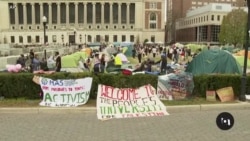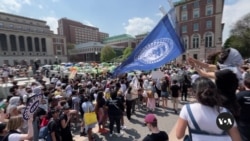Student Union
Columbia University demonstrators in talks with administration officials
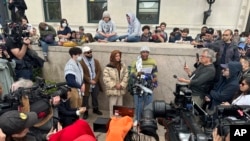
Officials at Columbia University were continuing talks Wednesday with student demonstrators from the Gaza Solidarity Encampment as the protest reaches a full week.
At 9:41 p.m. Tuesday, university President Nemat “Minouche” Shafik sent an email to the Columbia community setting a midnight deadline for an agreement to be reached about dismantling the encampment and dispersing the protesters.
“I very much hope these discussions are successful,” she wrote. “If they are not, we will have to consider alternative options for clearing the West Lawn and restoring calm to campus so that students can complete the term and graduate.”
As midnight passed, Columbia University Apartheid Divest posted a statement on X saying, “We refuse to concede to cowardly threats and blatant intimidation by university administration. We will continue to peacefully protest.”
The statement also said the university had threatened to call the National Guard. But after visiting the university earlier in the week, New York Governor Kathy Hochul said Tuesday she had no plans to deploy the National Guard.
As midnight approached on Tuesday, a student organizer announced that the deadline had been extended to 8 a.m. Wednesday.
At 4:09 a.m., the Office of the President sent an email saying the discussion deadline would be extended for 48 hours, given the constructive dialogue, and the university would report back on progress.
The email announced that leaders of the student encampment had agreed to remove a significant number of tents, get non-Columbia affiliates to leave the encampment and comply with New York Fire Department requirements. They also agreed to ensure that the encampment is “welcome to all” and to prohibit “discriminatory or harassing language.”
This development comes nearly a week after more than 100 students were arrested at the school on April 18, after Shafik authorized police to clear away protesters. Some of the students received suspension notices from the school.
Columbia’s action prompted an onslaught of pro-Palestinian demonstrations at other universities and responses from faculty and politicians.
Students at other campuses, such as Yale, Stanford and New York University, have also rallied around the Palestinian cause, calling for their universities to divest from companies with ties to Israel and for a cease-fire in Gaza. Many also have put up tent encampments on their campuses. About 150 students and faculty were arrested at New York University Monday night.
Columbia also announced Tuesday morning that classes on the Morningside main campus, where the protests are taking place, will be offered in a hybrid format for the remainder of the spring semester. The last day of classes is April 29.
See all News Updates of the Day
- By VOA News
Many African students are experiencing US visa rejections

In 2022, 71% of student visa applications from Western Africa were rejected.
Visa agents are not happy – and are finding ways to help applicants with paperwork and the interview. Maina Wururu reports for The PIE News. (April 2024)
- By Tina Trinh
US college students face muted graduations amid Gaza war protests
Commencement ceremonies are being scaled back or canceled at U.S. universities because of security concerns over pro-Palestinian student protests. While some campus demonstrations have resulted in concessions, others have led to violent confrontations. VOA’s Tina Trinh has the story from New York.
- By Melos Ambaye
Police arrest 33 at George Washington University protest encampment
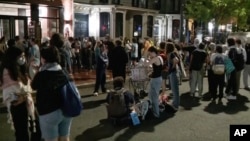
Police in Washington cleared a pro-Palestinian protest encampment at George Washington University early Wednesday, arresting 33 people, authorities said.
Arrests were made on charges of assault on a police officer and unlawful entry, the District of Columbia's Metropolitan Police Department said.
A congressional committee canceled a hearing on the university encampment Wednesday. D.C. Mayor Muriel Bowser and Washington Police Chief Pamela Smith had been scheduled to testify about the city’s handling of the protest before the House Committee on Oversight and Accountability.
University parents and faculty members gathered Wednesday afternoon for a press conference to condemn the handling of the protests by police and school leaders.
“The university clearly does not value the students at all and has endangered the safety of our children by unleashing officers dressed in full riot gear to assault and spray our children in their eyes with pepper spray,” said Hala Amer, whose son participated in the campus protests.
Police said they dispersed demonstrators because "there has been a gradual escalation in the volatility of the protest."
American University professor Barbara Wien said she stayed in the encampment with GW students. She described the student protesters as democratic and peaceful.
Police started to shut down the tent encampment after dozens of protesters marched to GW President Ellen Granberg's on-campus home on Tuesday night. Police were called, but no arrests were made.
Speakers at the conference called for Granberg’s resignation because, they alleged, she refused to meet and negotiate with student protesters.
“You keep inciting violence and ignoring the students,” Amer said about Granberg in an interview with VOA after the conference. “It will just lead to more violence. You need to talk to your students.”
GW officials warned students that they could be suspended for engaging in protests at the school’s University Yard, an outdoor spot on the campus.
"While the university is committed to protecting students' rights to free expression, the encampment had evolved into an unlawful activity, with participants in direct violation of multiple university policies and city regulations," a GW statement said.
More than 2,600 people have been arrested at universities across the country in pro-Palestinian protests, according to The Associated Press.
Students are calling on their university administrations to divest investments from Israel or companies with ties to Israel. Demonstrators have gathered in at least 50 campuses since April 17, carrying signs that read "Free Palestine" and "Hands off Rafah."
Rafah is Gaza’s southernmost city, where most of the territory’s population has clustered. The area is also a corridor for bringing humanitarian aid into the Palestinian territory.
Israel seized the Gaza side of the Rafah crossing on Tuesday, while shutting off the nearby Kerem Shalom crossing, drawing criticism from humanitarian groups. Israel said Wednesday that it had reopened Kerem Shalom.
The nationwide campus protests started in response to Israel's offensive in Gaza that began after Hamas launched a terror attack on Israel on October 7, killing about 1,200 people and taking roughly 250 hostages.
More than 34,000 Palestinians have been killed in Israel's offensive, according to the Gaza Health Ministry. Israel warned it could "deepen" its operation in Rafah if talks failed to secure the release of the hostages.
Some information for this report came from The Associated Press.
- By VOA News
What to ask on a college visit
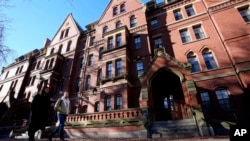
Sarah Wood lists 32 questions for applicants to learn more during a campus visit. (April 2024)
- By VOA News
US is now the most desirable country for international students

That’s according to this year’s Emerging Futures research survey, from education consultant IDP Connect. Other Western countries have slipped due to new visa restrictions and caps on international students. Read a summary of the research from ICEF Monitor. (April 30, 2024)




